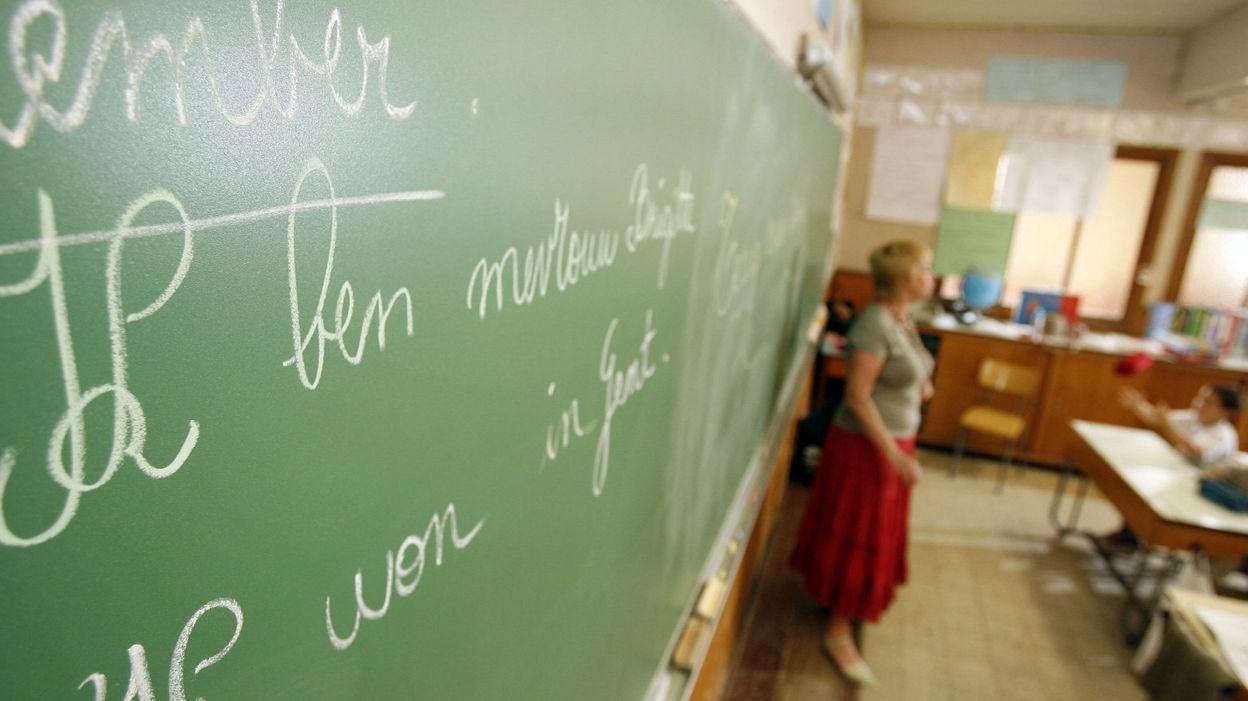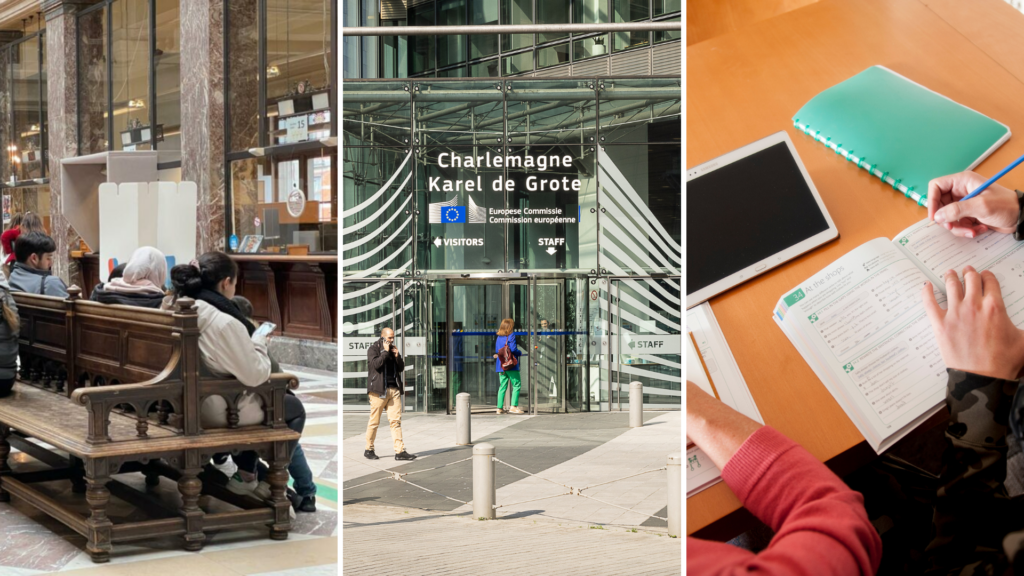The internationalisation of Brussels is increasingly reflected in the languages spoken in the region. The latest Language Barometer shows almost half of the region's citizens speak English fluently and Dutch speakers are on the rise, while French is losing ground.
More than one in three people living in Brussels (36.9%) are non-Belgian, and around a quarter of residents are EU citizens. As the region becomes more cosmopolitan, the languages spoken shift too. This is reflected in the BRIO Language Barometer of the VUB. For 25 years, researchers have been studying the language use and knowledge of Brussels residents.
Initially, the purpose was to follow the Dutch language in Brussels, but the Barometer now focuses more on multilingualism. The last two editions (2018 and 2024) have confirmed that the Brussels-Capital Region is no longer dominated by French, but instead is home to a vast array of languages.
"Our first observation was that language diversity in Brussels remains very high," Mathis Saeys, a VUB researcher who worked on the Language Barometer, told The Brussels Times. "This year, we registered 104 different languages spoken in the region – and this is most likely an underestimation of the effective language reality in Brussels." Remarkably, in the 2001 Barometer, just 74 languages were recorded.
Saeys underscored that multilingualism has therefore not just become the norm in Brussels, but rather a necessity. "As so many languages are spoken, Brussels residents have to use different languages in their everyday interactions."
English gaining in importance
This increased linguistic diversity has led to more multilingual Brussels residents, particularly English speakers. Since the second Barometer in 2007, Dutch – one of the two official languages in the region – has been relegated to third place by English, which is now the second most widely spoken language.
Nearly half of Brussels residents (47%) speak English, up from just 33% in the 2001 Barometer. "It is mainly spoken among the younger generations," Saeys said, adding that it is primarily a school language and less of a family language. He noted that English is not only spoken increasingly among Belgians but also international residents.
The rising use of English as a common language in Brussels has sparked a debate about weaving it into the administrative fabric of the region. Brussels Minister for Multilingualism, Sven Gatz, has repeatedly said the Capital Region's non-official third language should become an official administrative language in Brussels, alongside French and Dutch. In light of the Barometer's results, he reiterated his argument.
"Policy-makers should see this as a sign that English should be used officially at the administrative level," he told The Brussels Times. "We can increase oral services in English, for example in communes, and possibly in other languages too." However, the Federal Government would not allow English to be used in official written communication.
A legislative amendment would be needed for English to become an official language in the region, and this adaption of the language law is a federal competence. "This is something I am also advocating," Gatz said. "It is clear English can and should have a place in the legal, administrative and institutional framework of Brussels."
Institutions and administrative bodies are already changing their use of the three main languages, now combining Dutch with French or combining the two official languages with English. "Since the third Barometer onwards we have observed an increasing use of English in administration," Saeys explained.
Dutch rising, French losing ground
French remains the lingua franca in Brussels, but the share of people speaking it has dropped significantly since 2001 from 95% to 81%. This also means that 19% of Brussels residents do not speak French, which is believed to be a consequence of multilingualism.
Meanwhile, the phenomenon has strengthened Dutch's presence in Brussels, Gatz and Saeys argued, as it has shifted the narrative away from the French-Dutch pain points. "Despite different languages being combined, it gives more room for Dutch to be used in a whole range of contexts, for example at work and within administrative bodies," he said.

Dutch lessons in school. Credit: Belga
Researchers have observed a turnaround on several fronts. Since the 2018 Barometer, the percentage of Dutch speakers rose from just 16% to 22.5%. "More young people in Brussels speak Dutch and have a better grasp of the language," Saeys said. "This is a direct result of the success of Dutch-language education." The figure not only includes Dutch native speakers therefore, but can also be explained by the influx of Dutch-speaking people who settle in Brussels.
However, the knowledge of Dutch among pupils in Brussels' French-language schools remains poor. Of the Brussels residents who went to school in the French-speaking education system in Brussels, only 6.5% know Dutch – down from 20% in 2001. "The fact that the Dutch-language knowledge among these people is still dropping is both very unfortunate and worrying," said Gatz. Meanwhile, 83% of residents who went to Dutch-speaking schools know French.
Exclusion through language
In contrast with the rise in multilingualism, the number of people who speak neither Dutch, French nor English has risen in the past 25 years, reaching 10.5% in 2024, up from 3% in 2001. "This group is mainly non-Belgians, who are usually middle-aged and low-skilled," Saeys said.
He stressed that these people are more likely to experience substantial barriers when trying to participate in society. "For example, their interactions with administration will be more challenging, they will not be fully assisted by the healthcare system, and will find it harder to enter the labour market." This puts them at greater risk of social exclusion.
Language classes through the House of Dutch are free for Brussels residents, but Gatz also noted this is where the integration process comes into play. "People from outside the European Union are obliged to take part in integration programmes. In Brussels, they are given the choice to do so in Dutch or French."
Gatz stressed that the Language Barometer surveys were carried out before the integration process became mandatory in the region. "So by the next Barometer, we should see a change in this figure."
Related News
- Rue de la Loi, Wetstraat, Law Street? English may become Brussels' third official language
- Where to learn French and Dutch as an adult in Belgium
- Twenty words to insult someone like a true Belgian
- Twenty untranslatable expressions that will instantly make you sound more Belgian
Internationalisation and multilingualism in Brussels have pushed aside the decade-long language tensions which pitted French against Dutch. Languages are now complementing each other rather than competing against one another.
Saeys concluded that a clear reality has emerged from the latest Language Barometers: "The fifth one reaffirms that Brussels residents are using multiple languages because there is a need to do so. They have to master those different languages to be able to participate fully in Brussels society."
He added that it is inevitable that language diversity will continue to grow in Brussels, and that an altered use of language will become a part of daily life. "The young Brussels residents have long understood this, and I hope other people in the region will also now understand it too."

